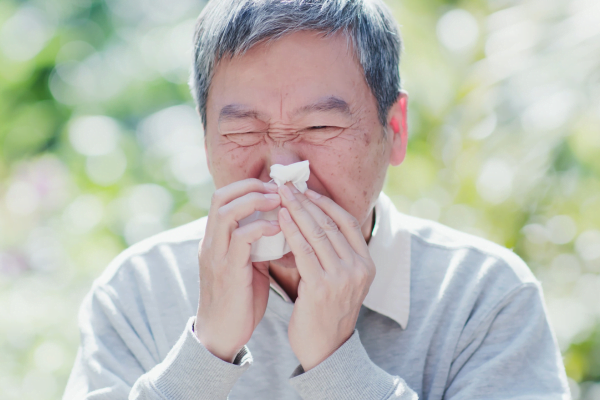Allergic rhinitis, commonly known as hay fever, is a prevalent condition affecting millions worldwide. It occurs when the immune system overreacts to allergens in the air, triggering symptoms such as sneezing, nasal congestion, and itching. Understanding the symptoms and available treatments is crucial for managing this condition effectively.
Understanding Allergic Rhinitis
Allergic rhinitis is an allergic reaction that occurs when the body’s immune system identifies harmless substances such as pollen, dust mites, pet dander, or mold spores as threats. When exposed to these allergens, the immune system releases histamines and other chemicals, leading to inflammation of the nasal passages and symptoms like sneezing, runny or stuffy nose, itching, and watery eyes.
Symptoms of Allergic Rhinitis
Recognizing the symptoms of allergic rhinitis is essential for timely intervention and management. Common symptoms include:
- Sneezing – Frequent and uncontrollable sneezing, especially upon exposure to allergens.
- Nasal congestion – Feeling of stuffiness or blockage in the nasal passages due to inflammation.
- Runny nose – Excessive production of clear, watery mucus from the nasal passages.
- Itchy nose, throat, or eyes – Persistent itching sensation in the nose, throat, or eyes, often accompanied by irritation.
- Watery eyes – Excessive tearing and redness of the eyes, particularly in response to allergen exposure.
These symptoms can vary in severity depending on individual sensitivity to allergens and environmental factors.
Treatments for Allergic Rhinitis
Several treatment options are available to manage allergic rhinitis and alleviate its symptoms. These include:
- Avoidance of allergens – Identifying and avoiding triggers such as pollen, dust, pet dander, and mold can help reduce symptom severity.
- Nasal corticosteroids – These prescription or over-the-counter nasal sprays help reduce inflammation and relieve nasal congestion.
- Antihistamines – Oral or nasal antihistamines block the action of histamines, reducing symptoms like sneezing, itching, and runny nose.
- Decongestants – Oral or nasal decongestants provide temporary relief from nasal congestion by shrinking swollen blood vessels in the nasal passages.
- Immunotherapy – In cases of severe or persistent allergic rhinitis, allergen immunotherapy (allergy shots or tablets) may be recommended to desensitize the immune system to specific allergens.
Best Antihistamine for Allergic Rhinitis
Choosing the right antihistamine is crucial for effectively managing allergic rhinitis. While many options are available, second-generation antihistamines such as cetirizine (Zyrtec), loratadine (Claritin), and fexofenadine (Allegra) are often preferred due to their non-drowsy formulations and long-lasting effectiveness. These medications effectively relieve symptoms like sneezing, itching, and runny nose without causing significant sedation.
Takeaways
Allergic rhinitis, or hay fever, is a common condition characterized by symptoms like sneezing, nasal congestion, and itching, triggered by exposure to allergens. Understanding the symptoms and available treatments, including antihistamines, nasal corticosteroids, and allergen avoidance, is essential for effectively managing this condition and improving quality of life for those affected. Consultation with a healthcare professional can help determine the best treatment approach tailored to individual needs and symptom severity.
Frequently Asked Questions (FAQs)
How is allergic rhinitis diagnosed?
Allergic rhinitis is typically diagnosed based on a combination of medical history, physical examination, and allergy testing. Your healthcare provider may ask about your symptoms, triggers, and family history of allergies. Allergy testing, such as skin prick tests or blood tests, can identify specific allergens that trigger your symptoms.
What are the common triggers of allergic rhinitis?
Common triggers of allergic rhinitis include pollen from trees, grasses, and weeds, dust mites, pet dander, mold spores, and certain foods. Identifying and avoiding these triggers, when possible, can help reduce symptom severity
Can allergic rhinitis lead to complications?
Untreated or poorly managed allergic rhinitis can lead to complications such as sinus infections (sinusitis), ear infections (otitis media), nasal polyps, and exacerbation of asthma symptoms in individuals with asthma. Seeking appropriate treatment and allergen avoidance can help prevent these complications.

